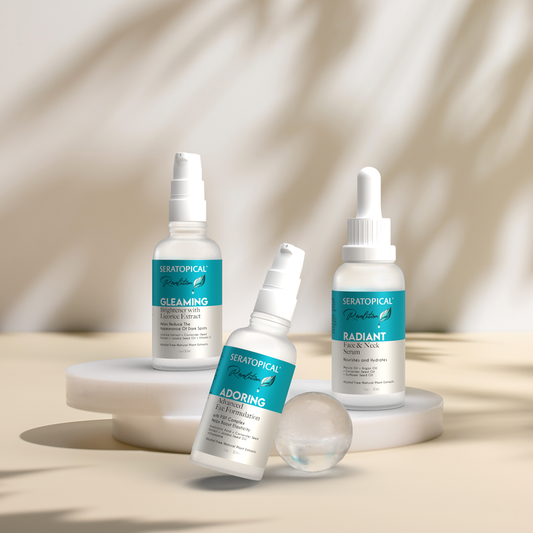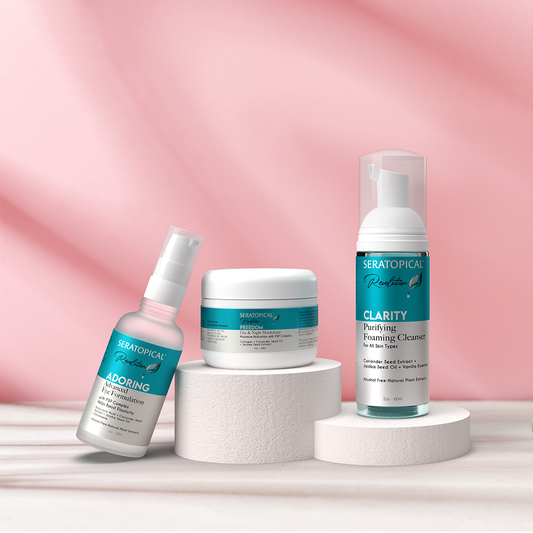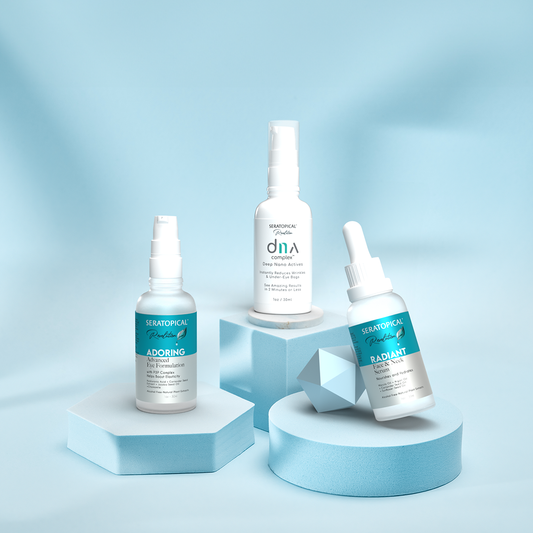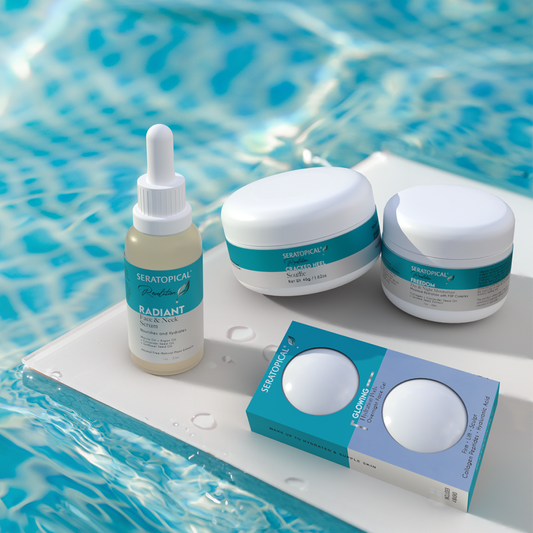When it comes to your skin health and your skincare regimen, it's easy to get caught up in all the 'noise' with all the different products and ingredients available. There is so much information available to us that it can be hard to distinguish between information that is true and that which is false. It's easy to feel the need to snatch up the very first product range you find at the local store or see advertised on TV or on social media to look after our skin and practice proper skincare. However, one aspect that often gets neglected when selecting your skincare products is the actual ingredients contained in these products.
Ingredients in Skincare Products
Every single time that we make use of skincare products, it may be an opportunity to feed our skin with nutrients and amino acids. Our skin is the largest organ in the human body and our skin is very porous. Our skin is alive, and subject to the environment and chemicals that exist in the world.
Environmental Impact of Skincare Ingredients
What products and brands we choose for our bodies can also impact the world around us - factors such as packaging and animal derived ingredients in beauty products all may have an impact on the environment in different ways and we may be able to control the role that we play in these factors when choosing what to purchase. Opting for organic skincare products and plant-based beauty products may seem like a simple option, but unfortunately some products labelled as plant-based may still contain harmful ingredients. Let's dive into what we should really be looking for in our skin care, and how to tell if ingredients in plant-based skin care products really are beneficial for our skin. We will also explore the benefits of choosing products with plant-based ingredients.
What are Plant-Based Ingredients
What are plant-based ingredients and why do you want to use them in your skin products? Plant-based ingredients are ingredients that are taken from nature itself. Products may come from plant sources such as tea tree oil, jojoba oil, coconut oil, lavender oil and other plant oils you may have heard of before. Other plant-based ingredients may include minerals from salts or ocean and spring water for example. Vitamin E is best known in skincare for its ability to help retain moisture.
Other plant-based ingredients such as olive oil is used often in cooking and may also be beneficial when used in skincare as a moisturizer. Hemp oil is another plant-based ingredient that is known for its possible moisturization benefits in skin care. Plant-based products don't automatically mean that they are 'safe to use' in skin care. There are many plant-based skin products and ingredients that certain people may be sensitive to. This is why it's important for skin care products to have been tested and analyzed by professionals, such as the SeraLabs plant-based beauty products.
Benefits of Natural Ingredients
Natural ingredients for face care offer numerous benefits that cater to both skin health and environmental sustainability. These ingredients, derived from plants, minerals, and other naturally occurring sources, are rich in essential vitamins, antioxidants, and nutrients that help to nourish, hydrate, and rejuvenate the skin. Unlike synthetic chemicals, natural ingredients are less likely to cause irritation, making them suitable for all skin types, including sensitive skin. Additionally, they often have anti-inflammatory and antimicrobial properties that can help to soothe and heal the skin. By choosing natural ingredients for face care, individuals can enjoy a holistic approach to skincare that promotes a healthy complexion while also being gentle on the planet.
Plant-Based Ingredients
Vegan beauty is something we hear about a lot especially alongside the word plant-based. Plant-based ingredients are any ingredients that are not derived from animals in any way. Cruelty free products mean that the range of skin products has not been tested on animals. When looking for plant-based skin care you should also ensure that the brand is alcohol free. Plant-based ingredients are found in and taken from nature, ingredients that humans have used for many years. Plant based skin care makes use of these ingredients for their potential moisturization.
Coconut Oil
Coconut oil is a plant-based skin and hair moisturizer that may also act as an antioxidant. Coconut oil is plant based as it is extracted from coconuts and used in plant-based skin care products.
Hemp Seed Oil
Hemp seed oil has properties that may be used to moisturize both skin and hair and may have possible anti-aging benefits. Hemp seed oil has become a very popular plant ingredient for skin and hair use with its many benefits that may help in calming irritated skin.
Shea Butter
Shea butter comes from the nuts of karite' trees and have long been harvested for both skin and hair care products.
Jojoba Oil
Jojoba oil is a plant-based skin care oil that is often used in skin products as it may have moisturizing properties. Jojoba may also be used as a make-up remover for people with sensitive skin types.
Tips for Including Plant-Based Skincare Into Your Routine
Incorporating plant-based skincare into your routine can revolutionize your skin health by leveraging the power of natural, nutrient-rich ingredients. Start by gradually introducing products one at a time to observe how your skin reacts, ensuring each new addition complements your existing regimen. Opt for cleansers, toners, serums, and moisturizers formulated with botanical extracts, essential oils, and natural antioxidants that target specific skin concerns without harsh chemicals. Regular exfoliation with plant-based scrubs can help maintain a smooth complexion, while masks infused with organic ingredients provide deep nourishment. Additionally, paying attention to ingredient lists and researching the benefits of different plant-based components can help you make informed choices tailored to your skin's unique needs.
Seratopical Revolution is a top choice for plant-based skincare due to its commitment to high-quality, natural ingredients that are scientifically formulated to deliver effective results. Their products harness the potency of plant-derived compounds, ensuring your skin receives maximum benefits with minimal risk of irritation. Seratopical Revolution's dedication to sustainable and ethical practices further enhances its appeal, making it a brand you can trust for both efficacy and integrity. By integrating Seratopical Revolution products into your skincare routine, you can enjoy a holistic approach to skincare that promotes a healthy, radiant complexion while supporting cruelty-free practices.
Fragrances in Skincare
Many skin care products contain fragrances, and you might get both plant-based and artificial fragrances in skin care ranges. A plant-based fragrance is one that is derived from plant-based ingredients such as essential oils. Lavender oil and, and tea tree oil, each of these oils and their plant-based fragrances have their own specific benefits.
The Potential Healing Benefits of Aloe Vera
Aloe vera is a succulent that grows in the wild and is cultivated for commercial use. Aloe vera plants have thick succulent leaves with a high-water count and the liquid in the leaves may contain potent antioxidant properties. Aloe Vera may help to calm skin when it is irritated. Plant based skin care may have benefits when used appropriately.
How to Remove Dead Skin Cells
Removing dead skin cells may help the skin to increase cell turnover, and once this happens, a smoother skin surface may be the result. The use of plant-based exfoliation may help to remove dead skin cells from the skin on your body or face and may prepare the skin for the receiving of nutrients and plant-based antioxidants. A plant-based skin care regimen should include exfoliation of the skin at least once a week, some beauty brands have gentle daily exfoliation properties which may help in removing skin cells whenever you wash your face.
Plant-Based Skincare
Making use of innovative technology and superior plant-based ingredients, SeraLabs uses proprietary formulations of these plant-based extracts in their Seratopical Revolution skin products. "I have always been obsessed with natural, Alcohol-Free ingredients for my skin. Revolution is a full-body line packed with plant-based extracts and peptide blends to create an all-inclusive ultimate skincare experience for everyone." - Nicole Kidman – Global Brand Ambassador & Strategic Partner Seratopical Revolution, using plant base extracts that have been cultivated for thousands of years.










